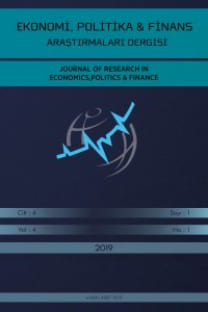FELDSTEIN-HORIOKA HİPOTEZİNİN EKONOMİK KÜRESELLEŞME VE İLE YENİDEN ELE ALINMASI: FOURIER PANEL EŞ BÜTÜNLEŞME
Ekonomik büyümenin önemli belirleyicilerinden biri olarak yatırımların finansmanı yurtiçi tasarruflar tarafından karşılanmasının yanı sıra kapitalist iktisadi sistemin küresel entegrasyonu arttıkça yatırımların dış tasarruflara olan bağımlılığı da artırmaktadır. Çalışma, literatürde Feldstein ve Horioka (1980) çalışması ile ortaya konan uluslararası sermaye hareketliliği arttıkça yatırım ve tasarruf arasındaki güçlü ilişkinin zayıfladığına ilişkin teorik çerçevenin geçerli olmadığına yönelik ampirik bulgulara dayanan hipotezi ekonomik küreselleşme olgusunu dikkate alarak yeniden ele almaktadır. Bu ilişkinin araştırılmasında literatürde sıklıkla çalışılan OECD ülkeleri ya da gelişmiş ekonomilerin dışında son kırk yılda küresel iktisadi kalkınmanın itici gücü olan gelişmekte olan ülke ekonomileri çerçevesinde ele alınmıştır. Çalışmada yapısal değişimleri modele içsel olarak yerleştiren Fourier panel eşbütünleşme testi ve nedensellik analizleri yapılmıştır. Sonuçlar gelişmekte olan ülkelerde yatırımların tasarruflara bağımlılığın ülkelere göre değişiklik göstermesine rağmen yatırımların tasarruf tutma katsayısının gelişmiş ülkelere nispeten düşük olduğu görülmektedir. Ayrıca bulgular yatırımların gelişmekte olan ülkelerin küresel kapitalist iktisadi sisteme entegrasyon derecesi ile anlamlı ilişkinin olmadığını, FH hipotezinde yer alan çelişkinin gelişmekte olan ülkeler için geçerli olduğunu göstermektedir.
Anahtar Kelimeler:
Yatırım, Tasarruf, Gelişmekte Olan Ülkeler, Yapısal Kırılmalar, Panel Eşbütünleşme
Revisiting the Feldstein Horioka Hypothesis with Economic Globalisation : Fourier Panel Co-integration
As one of the critical determinants of economic growth, investments are financed by domestic savings. However, as the capitalist economic system's global integration increases, investments' dependence on foreign savings also increases. The study revisits the hypothesis based on the empirical findings that the theoretical framework of Feldstein and Horioka (1980) that the strong relationship between investment and saving weakens as international capital mobility increases is not valid, considering the phenomenon of economic globalization. In investigating this relationship, it is considered within the framework of developing country economies that have been the driving force of global economic development in the last forty years, apart from OECD countries or developed economies, which are frequently studied in the literature. In the Fourier panel cointegration test and causality analyses are conducted in the study, which endogenously incorporate structural changes into the model results show that although the dependence of investments on savings in developing countries varies across countries, the coefficient of investment-savings retention is relatively low compared to developed countries. Moreover, the findings show that there is no significant relationship between investments and the degree of integration of developing countries into the global capitalist economic system and that the contradiction in the FH hypothesis is valid for developing countries.
Keywords:
Investment, Savings, Developing Countries, Structural Breaks, Panel Co-integration,
___
- aaaaaaaaaaaaaaaaaaaaaaaaaaaaaa
- Yayın Aralığı: Yılda 4 Sayı
- Başlangıç: 2016
- Yayıncı: Ersan ERSOY
Sayıdaki Diğer Makaleler
Laboratuvar Deneylerinde Gerçek-Emek Görevleri
Sosyal Transfer Harcamalarının Hanehalkı Tüketim Harcama Yapısı Üzerine Etkisi: Türkiye Örneği
Ortak Makroekonomi Faktörlerinin ABD Hisse Senedi Getirileri Üzerindeki Etkileri
Feldstein-Horioka Hipotezinin Türkiye Ekonomisi İçin Sınanması: RALS Yaklaşımından Kanıtlar
Banka Sermayesi, Risk Alma ve Kârlılık İlişkisi: Panel Kantil Yaklaşımından Yeni Kanıtlar
Türker AÇIKGÖZ, Özge SEZGİN ALP
Kurumsal Yönetim ve Kâr Payı Dağıtım Politikası: Borsa İstanbul’da Bir Uygulama
